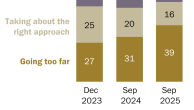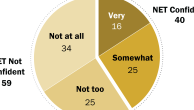About a fifth of Israelis (21%) say a way can be found for Israel and an independent Palestinian state to coexist peacefully, down from 26% last year. The share who take this stance has declined steadily over the past decade: 50% said peaceful coexistence was possible in 2013.
Despite this pessimism about a “two-state solution,” 56% of Israelis surveyed say the Israeli people are very or somewhat committed to working toward lasting peace. Fewer (41%) say this about the Palestinian people. (Because the questions about commitment to peace were asked for the first time in the 2025 survey, we do not know how these opinions may have changed over time.)
When it comes to leadership structures, 47% say the Israeli government is very or somewhat committed to lasting peace, and 45% feel the same about the Palestinian Authority. Far fewer Israelis (20%) see Hamas as committed to peace. In fact, a two-thirds majority say Hamas is not committed to peace at all.
Can Israel and an independent Palestinian state coexist?
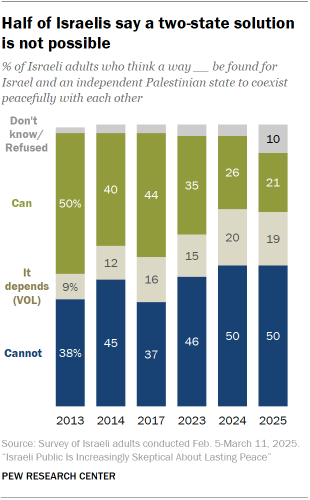
Around one-in-five Israeli adults (21%) think a way can be found for Israel and an independent Palestinian state to coexist peacefully. Half think this is not possible, and another 19% volunteer that “it depends.”
The share who think a two-state solution is possible has dropped 29 points since we first asked this question in 2013. In the shorter term, it’s fallen 14 points since spring 2023 (before the start of the Israel-Hamas war) and 5 points since spring 2024.
Four-in-ten Israeli Arabs think peaceful coexistence is possible – more than double the 16% of Israeli Jews who say the same. The share of Arabs who believe coexistence can happen is down 9 points since 2024, bringing their level of confidence in a two-state solution closer to what it was in 2023. The share of Jews who believe coexistence is possible has not changed significantly since 2024.
Around half of Israelis who place themselves on the ideological left (54%) say a way can be found for Israel and a Palestinian state to coexist, compared with 29% of Israelis in the center and 7% of those on the right.
Among Jewish Israelis, a quarter of Hilonim say peaceful coexistence is possible – more than twice the share of Haredim and Datiim (9%) or Masortim (11%) who say this.
Where would the independent Palestinian state be located?
Israelis who said Israel and an independent Palestinian state can coexist or who volunteered “it depends” were asked a follow-up question: Would they expect the independent Palestinian state to be in the West Bank, the Gaza Strip or both?
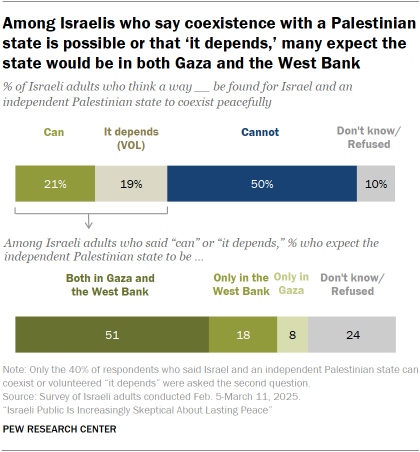
A sizable share of these respondents believe that the new Palestinian state would be in both the West Bank and Gaza. Fewer believe it would be only in Gaza or only in the West Bank. Still, only about a third of all Israeli adults overall gave a response to this question.
Arab Israelis are more likely than Jewish Israelis to expect the Palestinian state to be in both Gaza and the West Bank. And Israelis on the left are more likely than those in the center or on the right to say the Palestinian state would be in both places.
Who is committed to peace?
More Israelis say the Israeli people are committed to working toward a lasting peace with the Palestinians than say they are not committed (56% vs. 39%). But opinions are reversed when it comes to the Palestinian people (41% committed vs. 54% not committed), including 40% who describe the Palestinian people as not committed to peace at all.
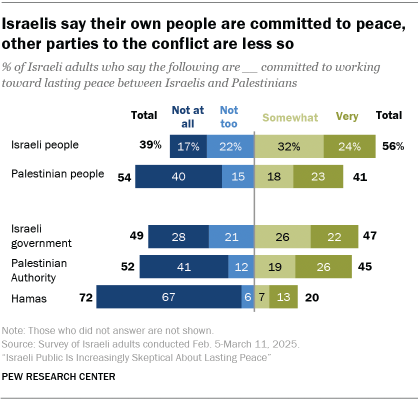
Israelis are about evenly split on whether their government is committed to peace. About half (47%) say the Israeli government is very or somewhat committed, while a similar share (49%) say it’s not too or not at all committed.
As for the Palestinian Authority, 45% of the Israeli public sees it as committed to peace, and about half says it is not (52%). A sizable share of Israelis (41%) say the Palestinian Authority is not committed to peace at all.
One-in-five Israelis say Hamas is committed to lasting peace between the two groups. About three-quarters (72%) say Hamas is not committed to peace – including 67% who say the organization is not at all committed.
Views by ethnicity
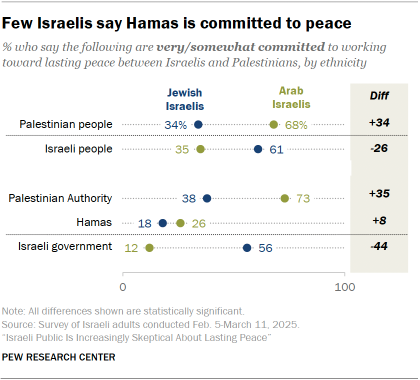
A majority of Jewish Israelis (61%) say the Israeli people are committed to lasting peace, while 34% say the same of the Palestinian people.
The opposite is true among Arab Israelis: 68% say Palestinians are committed to peace, while 35% say this about Israelis.
When asked about leadership structures on each side, nearly three-quarters of Israeli Arabs believe the Palestinian Authority is committed to peace (73%), compared with 38% of Israeli Jews who hold this view. Inversely, Jews are much more likely than Arabs to say the Israeli government is committed to lasting peace (56% vs. 12%).
Among both Israeli Jews and Israeli Arabs, about a quarter or fewer say Hamas is committed to lasting peace between Israelis and Palestinians.
Views by ideology
Israelis across the ideological spectrum are about equally likely to describe the Israeli people as committed to lasting peace. However, Israelis on the left (73%) are much more likely than those in the center (49%) or on the right (26%) to say the Palestinian people are committed to peace.
In addition, Israelis on the left are more skeptical of their own government: A quarter say the Israeli government is committed to peace, compared with 47% of those in the center and 59% of those on the right.
And left-leaning Israelis are much more likely to see the Palestinian Authority as committed to peace (79%) when compared with those in the center (57%) or on the right (27%).
Regardless of their ideological leanings, Israelis generally agree that Hamas is not committed to peace between Israelis and Palestinians. A quarter or fewer in each group say this is the case.
Views by Jewish religiousness
Half or more Israeli Jews in each religious group say the Israeli people and government are at least somewhat committed to lasting peace.
But Haredim and Datiim (16%) are less likely than Masortim (40%) and Hilonim (45%) to say the Palestinian people are committed to peace. Haredim and Datiim are also less likely to see the Palestinian Authority as committed to peace.
